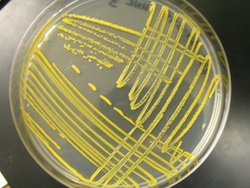By Janis Siegel ,
JTNews Columnist
As global governments focus on deterring nuclear threats and cyber-terrorism, we could be missing a longtime “frien-emy” in our midst that can keep us healthy — or take us out in a matter of hours. And they are everywhere.
In groups, these individuals are not afraid to act independently, or they can fall back and let others lead. Their sophisticated communication strategies allow them to quickly adapt to outside threats, and according to Israeli researchers, they may also be a key factor in how we choose our mates.
I’m talking about bacteria. Today, they are one of the top three killers in hospitals. They are smart, linguistic, and social, according to Prof. Eshel Ben-Jacob of Tel Aviv University’s Sackler School of Physics and Astronomy, whose team found that bacteria use 12 different complex messages to communicate in their nanoscopic version of Twitter. Researchers also found that they carry on dialogues, make collective decisions, and advise us to mimic their behavior not only for our survival, but to advance our progress in computer technology, robotics, artificial intelligence, and even to rethink cancer research.
With over 10 billion of them in a single, 8-centimeter-wide colony, Ben-Jacob showed a group at a recent Google Tech Talk seminar a sped-up food-tracking sequence, viewed through his microscope, of swarming bacteria which, he said, are highly successful at “social networking” and “chemical tweeting” to achieve their goals.
“Long before Google appeared, bacteria formed large social networks all over the globe,” said Ben-Jacob. “Acting jointly, these tiny organisms can sense the environment, process information, solve problems and make decisions so as to thrive in harsh environments.”
Working together, he added, bacteria can change genetically to adapt to a situation, with or without a leader, and they also save for the future, storing vital resources for any unforeseen challenges.
This ability to perceive, project into the future, and quickly adapt is no small thing.
Remember back to January 2011, when nearly 4,000 red-winged blackbirds fell out of the sky to their deaths in Beebe, Ark., and scientists were baffled? In that same week, 500 blackbirds plunged to the ground in Louisiana, dying, en masse, to the bewilderment of local residents, again, with no definitive explanation.
And in an equally perplexing event, just one week earlier, 83,000 drum fish washed up on the banks of the Arkansas River, only 100 miles from the location of the birds, with no apparent cause.
Adi Shklarsh, a doctoral candidate at TAU and a member of Ben-Jacob’s team, claims it is the superior communication tactics of bacteria that give them their edge on survival.
“Many animal swarms can be harmed by erroneous positive feedback, which is a common side effect of navigating complex terrains,” explained Sklarsh. “This occurs when a subgroup of the swarm, based on wrong information, leads the entire group in the wrong direction.
“But bacteria communicate differently, through molecular, chemical and mechanical means, and can avoid this pitfall.”
Okay. So bacteria cooperate, tweet, and even rearrange their genome in response to an obstacle, something Ben-Jacob calls “an epi-genetic collective identity switch” which, he said, might be a prototype that could help us understand complex and sudden societal changes, like social revolutions.
But what can bacteria teach us about why we are attracted to our choice of a mate or partner?
Well, it turns out that fruit flies that were fed two different diets showed a preference for mates who had the same bacteria in their guts from the same food.
Professors Eugene Rosenberg and Daniel Segel, along with doctoral student Gil Sharon of TAU’s Department of Molecular Microbiology and Biotechnology, found that this dietary effect showed up almost immediately in the two groups of the quickly reproducing flies who were fed different foods.
To test this, researchers isolated the specific bacteria, killed it with antibiotics and found that the mate preference was then eradicated. But when the bacteria were reintroduced into the flies, the preferential mating resumed.
Is it hard to believe that the pasta primavera you shared with your partner for dinner last night is the secret to your happy partnership? Well, maybe so.
But Ben-Jacob’s latest find is a new strain of bacteria, one of the three smartest he’s found, whose I.Q. he compares to Einstein’s.
So, don’t say you weren’t warned and don’t be shocked if, one day, it happens to you as it did to one Google employee who blogged, “No way. That bacterium just “˜liked’ me on Facebook!”
Longtime JTNews correspondent and freelance journalist Janis Siegel has covered international health research for SELF magazine and campaigns for Fred Hutchinson Cancer Research Center.
